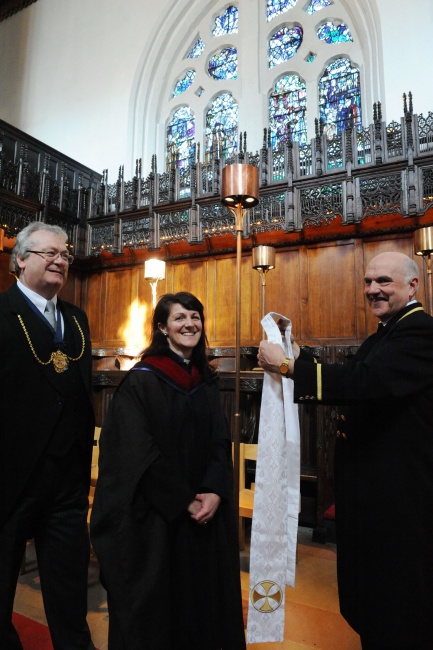A relationship lasting over 300 years has been further strengthened with the dedication of a set of magnificent pulpit and readers' falls in King's College Chapel.
The presentation took place at the annual service celebrating the historic link between the University of Aberdeen and the Seven Incorporated Trades of Aberdeen.
The long association between the organisations dates back to the time of Dr William Guild, Principal of the University, who became the first patron of the Trades in 1632.
Current Deacon Convener, David N Parkinson, said: “We were approached by the University’s Chapel Committee in October 2012, about sponsoring new pulpit falls.
“We engaged Ian Dale, of Angus Weavers, in Brechin - a member of the Weaver Incorporation - and a design was agreed for the pulpitfalls, reading desk falls and bible markers embroidered with gold coloured silk and braid fringing to match.”
Ex-Deacon Ian Dale also offered University Chaplain, Rev Dr Easter Smart, a new preaching scarf, embroidered with the same consecration crosses as on the pulpit falls.
In each of the set of four, the silk damask background in the four liturgical colours of white, purple, red, and green, is woven on a jacquard handloom, with the fine gold thread detail brocaded and embroidered during the weaving process.
The physical mark of the consecration crosses on the interior and exterior walls of a church signifies the sanctity of that place, which may not be transferred to common use. The consecration cross, in its most common and ancient form, is of four curved arms of equal length within a circle. It was constructed by a stonemason using a compass and applied at various places during the building of some of Scotland’s most iconic medieval buildings in Scotland, including Elgin Cathedral, The Church of the Holy Rude, in Stirling, Arbroath Abbey - and in Aberdeen, within the quadrangle and King’s Chapel, a number of these partial markings can still be seen.
University Principal Professor Sir Ian Diamond spoke of his delight at the generous gift, describing it as “a powerful reminder of our close relationship with the trades of our city. This link is as important today as it was in the 1600s.”


